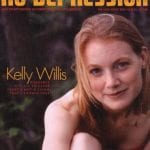Beth Orton – No more an orphan girl
Orton’s late teens were shaping up to be a heavy, hard-luck story, but her fortune would soon change. Six months after her mother’s death, she met an up-and-coming record producer named William Orbit, and that relationship would change her life.
Orbit had Orton hang around his studio as he made music, and that friendship evolved into a musical partnership. During lulls when he’d focus for hours on getting a particular hi-hat sound, Orton started fooling around with his collection of guitars.
“He said, ‘Why don’t you try singing? You have got really good pitch,’ and I had lots of words. We just started messing around, and I just got obsessed.”
They made some records together, which led to Orton collaborating with the dance outfit Red Snapper on a couple of singles. That brought an invitation from the Chemical Brothers to sing on the track “Alive Alone” from their 1995 album Exit Planet Dust. Set against the Chems’ uncharacteristically chilled-out backing track, Orton delivered the lyrics in a bereft voice that betrayed her mother’s memory: “I’m alive and I’m alone/And I never wanted to be either of those.”
Even as her dance card as a guest vocalist was filling up, she was assembling her own band and songs, and soon recorded Trailer Park. The album’s skipping dance beats and jazzy bass runs nestled alongside Orton’s unearthly songs to create a sound that accommodated the psychedelia of “Tangent” and “Galaxy Of Emptiness” alongside the moody “She Cries Your Name” and a knowing cover of the Ronettes’ “I Wish I Never Saw The Sunshine”.
Orton abandoned her acting ambitions to leap into music, a process she agrees was a bit like being fired out of a cannon. As a novice to music, she found it daunting to have to explain her work.
“I tried to come up with answers all the time: ‘This is normal, I can deal with this.’ But it was really weird,” she says. “The weirdest thing was living on a bus with all these people. And finding out all this stuff about myself as well. There is all the performing stuff, but also a lot of personal stuff.
“It is like an embryo being poked with a stick: ‘What are you?’ I don’t know what I am!…It’s like pulling a flower apart to see what makes it beautiful — plucking the leaves off, and then you have just a handful of stamen and broken petals.”
She managed to squeeze in an EP, Best Bit, recorded with veteran folk singer Terry Callier, but barely had time to stop for breath between touring for Trailer Park and making Central Reservation. The tour in support of her sophomore album saw Orton expanding her audience through a spot on the Lilith Fair tour. Recalling the all-female, Sarah McLachlan-fronted outing initially brings out Orton’s salty side; she jokes she was “interested and repulsed” by the experience, and amusingly recounts her friendly overtures being blown off by a haughty tour mate. But then, characteristically, Orton mitigates; she was “a bit of a lunatic” on the road. While “Sarah McLachlan and all that lot were sweet,” Orton says she was drinking and “living a bit of a rock ‘n’ roll dream,” which was viewed warily by some of the Lilith sisterhood.
She has found it particularly hard to deal with a convention of the music world: The intense-but-short showbiz friendship. “Since I have been making music, I have never made and lost so many friends so quickly,” she says. “I would make these really profound connections with people, and then a month down the line, I don’t see them anymore. It is a highly charged thing to do, to make music. I don’t like it, sometimes.”
She did manage to strike up a few acquaintances that would have an impact on Daybreaker, though. One Lilith participant who embraced Orton was Emmylou Harris. “She just inspired me — just so not full of shit,” says Orton. “She has maintained herself so beautifully. She just seems like a good person to me. Really down to earth. I would like to be her when I grow up one day.”
Later, during a Los Angeles Lilith tour stop, she struck up a backstage conversation with a man who possessed what she recognized as a northern English accent. He said he was a musician, and when Orton casually asked if she might know his work, the stranger replied: “Maybe. Have you heard of the Smiths?”
“Oh, fucking hell. You’re Johnny Marr,” Orton said when she realized the stranger was indeed the guitarist from the legendary Manchester band. The pair continued their conversation until dawn, with Orton playing him some of her new songs, and Marr suggesting little changes here and there. One of their collaborations, “Concrete Sky”, ended up on Daybreaker.
Aside from Marr’s musical contribution, their meeting triggered a self-realization for Orton. She had entertained thoughts of relocating abroad (the liner notes to Trailer Park even referred to San Francisco as “my home one day”), but her friendship with Marr made her realize there’s no place like home. “I was really getting ungrounded,” she says. “And in the end, I thought, fuck it. I want to go home. I am English. I have a sensibility…I really need my home right now.”




